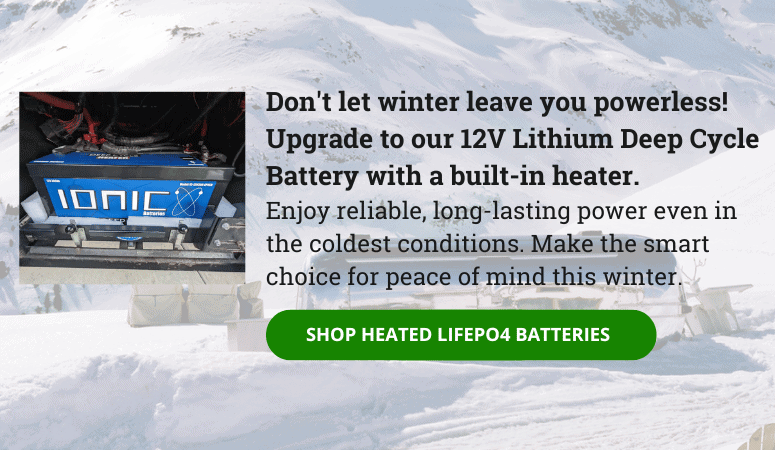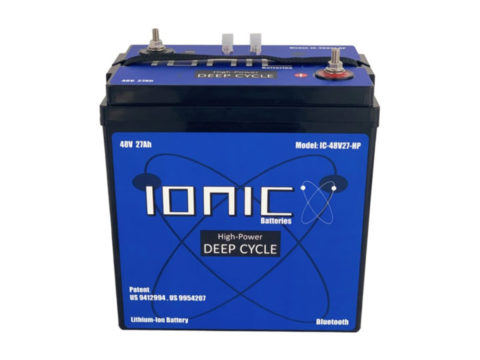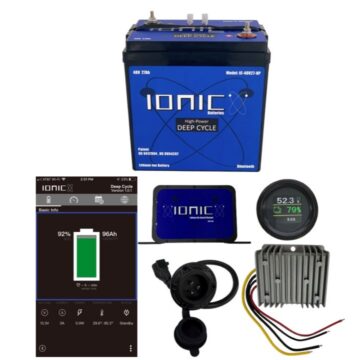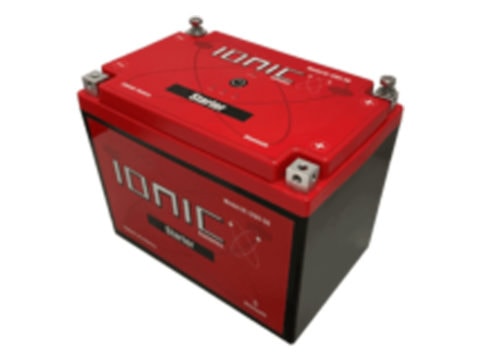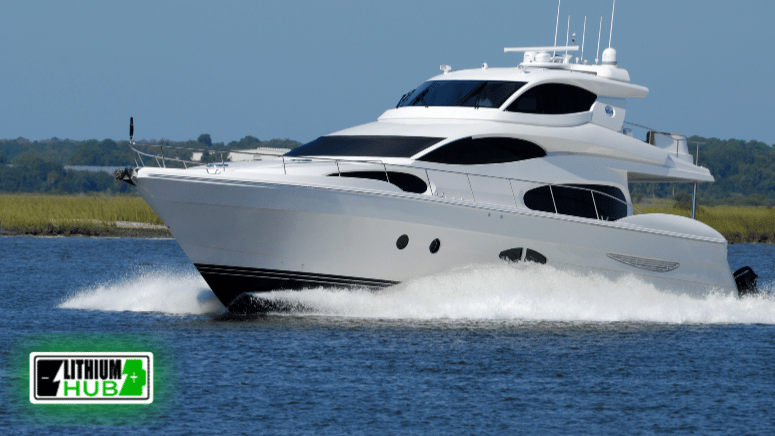Winter will be here in just a few short months, so it’s essential to recognize how cold temperatures can impact battery performance long before that. Do batteries freeze? Yes. These powerhouses that run our RVs, boats, ATVs, and many other devices, can be vulnerable when exposed to freezing climates. To prevent this from happening, let’s take a look at factors that make some batteries more susceptible to freezing, such as temperature levels and types of batteries. We’ll also provide helpful practices like correct storage, the optimal charging routine, and necessary upkeep to help prevent any damage from cold weather conditions.
Short Summary
- Different types of batteries have varying levels of susceptibility, so understanding their characteristics is important.
- Follow the tips and best practices outlined here for optimal performance & longevity – also, consider an Ionic lithium battery with a built-in heater before winter hits!
Understanding Battery Freezing: The Basics
Deep cycle batteries are vulnerable to temperatures that fall below freezing. Cold weather hurts the internal components of the battery and its ability to supply energy as well as hold a charge is diminished.
A frozen deep cycle battery can show several telltale signs including cracks along its casing, bulging sides or swollen edges, lack of liquid sound if moved around (depending upon the type of battery), and even ice accumulation. All these issues unfortunately reduce power and can quickly make a battery useless.
Different types of deep cycle batteries offer varying levels of protection against harsh temperatures, with lead-acid and AGM generally being more sensitive than lithium-based alternatives. Fortunately, taking proper precautions ensures that your battery remains in great condition regardless of how chilly it gets outside!

Types of Batteries and Their Susceptibility to Freezing
When looking for the best battery to meet your needs, it’s important to understand how well each type of battery performs in cold weather and freezing temperatures. Let’s compare their performance by looking at lead-acid batteries, AGM batteries, and LiFeP04 lithium batteries. By doing so, we can determine which is best suited for harsh environments and get a better idea of how to protect them in low-temperature exposure. Let’s take a look at some of the most popular battery types:
AGM Batteries vs. Flooded Batteries
AGM batteries offer greater output power and faster recharge rates than flooded lead-acid batteries. They’re also low maintenance and able to be mounted in any position. In contrast, lead-acid batteries contain a liquid electrolyte that is vulnerable to spilling should the cell become damaged or tipped over. Plus they also require regular upkeep such as monitoring their electrolyte levels.
When it comes down to cold temperatures and vulnerability against freezing, AGMs perform better than lead-acid batteries. This is because they’re not super needy when it comes to maintenance – making them more likely to survive a cold winter. They are, however, sensitive to overcharging and undercharging, so you’ll need to keep a close eye on them throughout the winter. And they do discharge quicker than some battery types.
Lithium Batteries & Heated Lithium Batteries
In cold weather, lithium batteries stand out from other kinds of batteries due to their capacity for prolonged use and resilience in the face of freezing temperatures. There are a few reasons for this. One is that lithium batteries discharge much less per month than other battery alternatives. This is especially important in winter when a battery’s charge can deplete even quicker than normal and cause major damage. And while some batteries can’t be used and discharged in temperatures that are too cold, lithium can. Ionic lithium batteries also have a built-in Battery Management System, that protects them from overcharging, undercharging, and other harmful conditions.
Whereas typical lead-acid batteries last an average of 400 cycles, lithium deep cycle batteries typically last around 5,000 partial cycles. They are worth investing in despite being costlier up-front, because they generally pay for themselves over time. Taking care of them by storing them correctly can keep a lithium battery functioning optimally even at low temperatures and prevent them from getting frostbite.
At LithiumHub, we’re proud to offer two lithium batteries that feature built-in heaters: our 12 Volt 125Ah Lithium Deep Cycle Battery w/ Heater and 12 Volt 300Ah Lithium Deep Cycle Battery w/ Heater. With this important function, you can charge your battery even in below-freezing temperatures – at a time when you really don’t want to be without power! The heater will automatically kick in whenever the temperature warrants it.
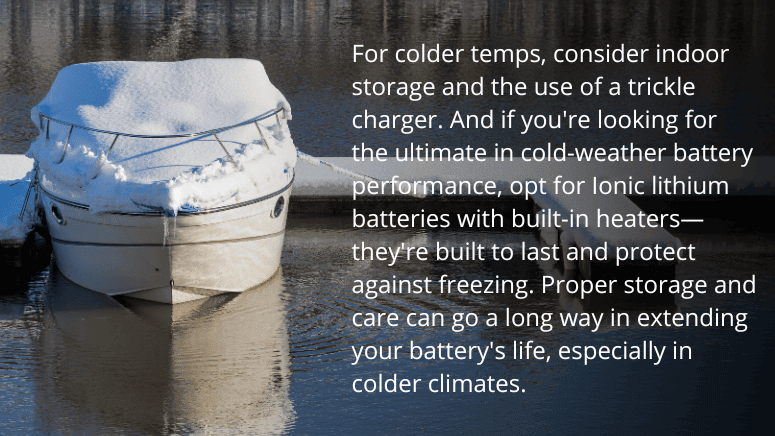
Need a battery for ice fishing? Discover How to Find the Best Lithium Ice Fishing Battery for Your Needs!
Preventing Battery Freezing: Tips and Best Practices
Deep cycle batteries are designed for use in RVs, boats, and renewable energy systems as they have the capability to be both discharged and recharged multiple times. In cold temperatures, their performance can suffer though. Thankfully high-quality cells are resistant to freezing so even at -20°C no problems should occur if the battery remains fully charged with adequate maintenance & proper storage. Regular maintenance along with cleaning will assist in preventing deep cycle batteries from becoming frozen while enhancing longevity at the same time.
To maximize the efficiency of your battery in cold weather, let’s discuss some of the specific ways you can do this:
Charging Your Battery in Cold Weather
When temperatures drop below 32 degrees Fahrenheit, it’s crucial to properly charge your battery in order to avoid freezing. To make sure of this, bring your battery indoors or under shelter and give it a warm-up period before connecting it to a power source. Also, using a trickle charger may be a good idea to keep your battery’s charge where it should be.
Proper Battery Storage & Battery Maintenance (Lithium Batteries don’t need maintenance)
It’s important to maintain proper battery storage, as it can help prevent freezing. This means storing the batteries in their original packaging or a dry container and keeping them at room temperature or even slightly cooler—avoiding extremely cold conditions is essential. Regular maintenance should be done: inspecting for corrosion/damage, cleaning terminals with baking soda solution, and ensuring mountings are secure and connections tight. For lithium batteries though, this upkeep isn’t as necessary since they’re made for extended life performance under extreme temperatures anyway! By observing good practices of storage & care you’ll reduce the risk of your battery freezing plus increase its lifespan accordingly.
“Winter is coming…” Learn How to Winterize Your Bass Boat Like a Pro!
Get an Ionic Lithium Battery That Features a Built-In Heater
To ensure that your battery can keep up with you even in the coldest of weather, consider investing in an Ionic lithium battery that features a built-in heater. These batteries come equipped with state-of-the-art BMS technology and have lifespans lasting anywhere between 3,000 to 5,000 partial cycles depending on usage. This added layer of protection helps prevent freezing, which might otherwise reduce performance or cause irreparable damage during winter.
Taking good care of your batteries as the temperatures drop is paramount if they’re going to last as long as possible. Heated lithium batteries offer peak reliability when it matters most, so investing in this could be well worth it. That way your battery can function optimally, even during frigid conditions!
To Sum it Up
Knowing the causes of battery freezing and understanding the various types of batteries is key to protecting them during cold weather. Good practices such as proper storage, maintenance, and appropriate charging can help extend your battery’s life while helping it stay functional throughout the winter months. By being mindful of preventive measures and going with a high-quality battery from the start, you’ll have more confidence that your power will remain strong despite harsh temperatures.
Frequently Asked Questions
Is a battery ruined if it freezes?
If a battery is not fully charged, freezing temperatures can cause it to be damaged beyond repair and necessitate the need for replacement.
Is it OK to charge a battery in cold weather?
Charging a deep cycle battery below 0°C (32°F) is not recommended, as it can cause permanent damage to your battery.
Which type of battery is least vulnerable to freezing?
Lithium batteries are particularly resilient when it comes to freezing temperatures which could be damaging for other types of batteries. Making them a great option for areas with sub-zero weather.
How can I prevent my battery from freezing in cold weather?
To ensure your battery won’t freeze in cold weather, consider investing in heated lithium batteries. These specialized batteries are designed to retain a consistent temperature. The heater function will automatically kick on whenever it’s needed! Learn about heated lithium batteries here.
Looking for lithium marine batteries? Go here.


